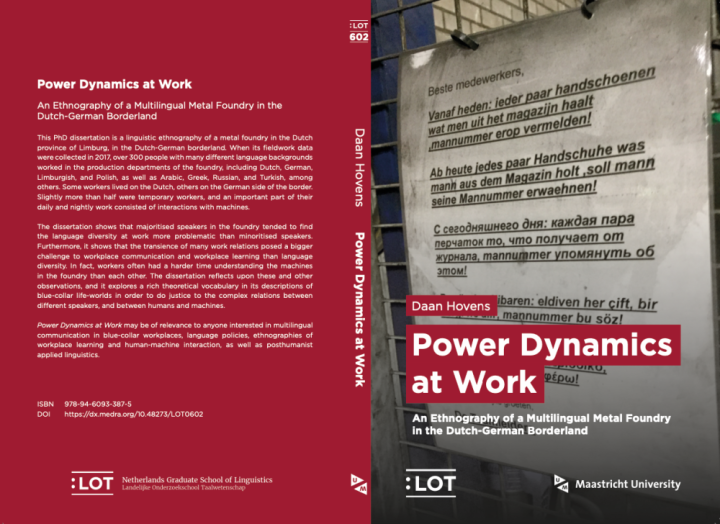Language policy and linguistic landscapes at a metal foundry
Dr. Daan Hovens, Maastricht University: Language policy and linguistic landscapes: Reflections from a metal foundry in the Dutch-German borderland
Abstract
In this presentation, I reflect on linguistic landscaping practices in a contemporary industrial production work environment, specifically a metal foundry in the Dutch-German borderland. Many, often temporary production workers with diverse language backgrounds commute to this foundry from various places of residence in the Netherlands and Germany every day and night. The languages spoken there include Dutch, German, and the regional minority language Limburgish, as well as Arabic, English, Polish, Russian, and Turkish, among others. In 2017, I worked as a participant-observer in the foundry for 3.5 months, while making audio and video recordings of workplace interactions. This linguistic-ethnographic approach had the advantage that I was not only able to count visible linguistic and semiotic signs in the foundry’s landscape, but that I was also able to observe communication practices involving visible and non-visible signs (such as spoken words). In one previous publication about this project (Hovens 2021), I have shown how each interaction can be understood as an act of linguistic landscaping, which either reproduces or challenges existing practices (sedimentation or modification). In line with this, I have conceptualised language policy as “linguistic landscaping”. In this presentation, I apply and elaborate on these ideas in three ways. First, I discuss my own linguistic landscaping practices as a researcher trying to access workplace discourse. Second, I shift my focus to other human actors in the foundry, their positionality, and interactional choices. Finally, inspired by posthumanism (Latour 2005; Pennycook 2018), I discuss how we may understand the linguistic landscaping practices of machines at work.
About the author
Daan Hovens is a postdoctoral researcher at the Institute for Transnational and Euregional cross-border cooperation and Mobility (ITEM) at Maastricht University. His current research project deals with the question why secondary schools in a Belgian-Dutch-German cross-border region do, or do not, invest in the education of so-called “neighbour languages” (Dutch, French, German). From 2017 to 2020, Daan was a PhD candidate at ITEM. His posthumanistically inspired PhD dissertation is a sociolinguistic ethnography of a metal foundry in the Dutch-German borderland. Chapters from this dissertation have appeared in the Journal of Linguistic Anthropology (2020), Language Policy (2021), and the Journal of Sociolinguistics (2022). Daan holds a double MA degree in Euroculture from the Georg August University of Göttingen and Uppsala University, an MA degree in Journalism and a BA degree in Scandinavian Languages and Cultures from the University of Groningen. Prior to his PhD studies, Daan worked as a journalist and web editor for the Dutch public broadcasting organisation VPRO.
